#but it might be misdiagnosed or i can be both
Text
hey guys if i told you i'm on the autism spectrum would you be surprised or you just knew and i didn't
be honest
#im gonna be seeing a doc next week and#looking for a new opinion and meds#it's either autism or audhd#bc i was like living last 4yrs or so thinking it's adhd#but it might be misdiagnosed or i can be both#if both i need even more therapy than i expected sobs
23 notes
·
View notes
Text
i've been considering recently that i might have ocd, but i'm like. not sure it's even possible to have both ocd and adhd? i've tried doing a bit of research on it but i can't find anything definitive - just that they have almost exact opposite patterns of brain activity. like, there's definitely something going on with me but i definitely, absolutely have adhd, so if it's not possible to have that and ocd then this must not be ocd??? idk
#like i was talking abt it with my friend who has ocd#and they were like idk man that sounds like ocd.#and i've thought before that it might be but then brushed it off bc i thought it ''wasn't bad enough''#but now i'm starting to seriously consider it and i'm like. idk if it's even possible to have both#and i was reading abt kids with ocd being misdiagnosed as adhd and i'm like no i for sure have adhd#and honestly these things i'm noticing now didn't start until i was older#whereas the adhd stuff has been as long as i can remember#i'm working on getting in contact with a therapist/psychiatrist abt it (and also for other mental health stuff)#but idk if i'm gonna look like an idiot going in being like hey i might have ocd?? and they're like that's just physically not possible#rey rambles#ocd#adhd
39 notes
·
View notes
Text
TIL i learned that a headcanon clash i’ve come up against may not need to be mutually exclusive… oops
#i may or may not have a new diagnosis sometime soon#which might make a certain ‘he’s not autistic he’s [x]’ argument completely moot if i have both#like i’ve never thought they were mutually exclusive diagnoses but i know that autism can be misdiagnosed as this other thing#and the reason it hinges on Me Me Me is because he’s my number one kin#so discovering new things about myself makes the characters i relate to make a lot more sense
2 notes
·
View notes
Note
can you please write dad!carmen and mom!reader stuck at home taking care of their two sick babies? carmy would be soo worried hate seeing his girls like that 💔
"Teddy, please don't cry, sweet girl."
"I know, Wills, I know it's nasty. Just a little bit more."
One was screaming, the other sobbing with deep, heaving breaths that made your own heart feel like it might spilt in two somehow. Strep had made its way into the Berzatto household. A mandatory forty-eight hours to make sure they both weren't contagious, an extra twenty-four tacked on so they could recuperate, and you weren't sure you were going to make it past day one.
Carmen had to stay home, of course, he wasn't risking infecting his staff or customers. You were thankful you had his help, especially at times like this.
Times when you were having to feed the girls their medicine. The pale pink liquid measured out in syringes, forced down their throats with gentle coaxes over their cries.
"I don't li-ike it!" Teddy sobbed, shoulders heaving. She was exhausted, sick, just uncomfortable all around. You knew she was. You wished you could jus magically make it better for her, take the pain instead so she'd go back to your bubbly, sweet girl.
"I know, baby." You hummed sympathetically, pressing the small sippy cup to her lips, thumb catching her angry tears streaking down her face. "But it will make you feel better."
"I want to feel better without that!" Teddy roared, crankily, throwing her arms out in pure frustration.
"That's the only way you can get better, Teddy Bear." Carmen chimed, soothing a still sobbing Willow in his arms, her face buried in his neck. She was still upset that he'd given her medicine to her. Sobbing in the most heart wrenching way; sad sobs, not like her sister's cries of frustration and anger- sobs that tore Carmen's heart right down the middle.
Somehow, you managed to get the two of them back down for a nap. They'd cried themselves to sleep, exhausted with emotion, collapsing in your's and Carmen's bed.
The two of you had took to the couch instead, falling nearly on top of each other. "Do you think we should take them back to the doctor?" Carmen muttered next to you.
"Why?"
"Because," Carmen hesitated, head lolling over to look at you. "I mean... They act like they're still in pain."
"That was their first dose, Carm. The medicine hasn't even had a chance to kick in." You countered gently.
"I know... I just- I-I was looking up their symptoms and what if it's meningitis or something? What if it was misdiagnosed and-"
"-Carmen, I swear to fuckin' God, I am blocking WebMD from your phone." You huffed lightly. "I don't know how I'm gonna do that, but I am. I'm gonna go to the Geek Squad and make them block it entirely."
"I'm being serious-"
"-So am I." You looked at him with a light glare. "Baby, they ran the tests. It came back strep. They have to like grow it and stuff to make sure, ok?" Carmen still looked unsettled. "If they wake up and don't feel better, we'll take them back."
"Fine." Carmen nodded, letting his head fall on your shoulder. "You think we should nap in there with them? Or stay in here?"
"Maybe one of us should go in there." You mutter. "Make sure Will doesn't throw up."
"True. Good point." Carmen sighed, rubbing his eyes when he sat up. "I'll go in there."
"I can go." You stand before he can, putting the blanket from the back of the couch on his lap. "You got them this morning. I got 'em, Daddy." You give him a playful, yet tired, wink. Carmen flushes, a shy smile that has your tummy pooling with warmth, pressing a kiss to his cheek before you're padding back to your bedroom.
#thebearer#carmen berzatto#dad!carmen berzatto x mom!reader#dad!carmen berzatto#carmy berzatto x you#carmen berzatto x fem!reader#carmen berzatto x reader#carmy x reader#carmy berzatto x reader#carmen berzatto x fem!reader#carmen berzatto x female!reader#dilf!carmen berzatto#dorothea “teddy” berzatto#willow natalia berzatto#bearblahs#carmen berzatto blurb#carmy berzatto#thebearerblurbs#carmen berzatto fluff#the bear#carmen berzatto fic#carmen berzatto fanfiction#the bear fx
427 notes
·
View notes
Text
Right, so, I've been seeing some persistent misconceptions in fanfiction where a character has ADHD. I'm a man of color with ADHD and I want to clear some things up. This is specifically about how people tend to write Ed Teach, but it can apply to other characters you're writing with ADHD. And I'd love if other people with ADHD, especially other people of color with ADHD, have any additions to tack on!
These things are NOT what ADHD is.
ADHD does not make you "stupid." This whole thing was inspired because I just read a fic where Ed cites his ADHD as evidence he's "dumber" than the other characters (and this was supported by the writing in the story). There is no correlation between ADHD and intelligence, and we know that Ed is a genius!
ADHD does not automatically mean that someone can't finish school or can't succeed in demanding academic fields. I'm working on my PhD. It just means your character needs coping skills.
ADHD does not mean that someone will "hyperfixate" on or suddenly lose interest in relationships, whether romantic or platonic.
ADHD doesn't mean your character struggles with personal hygeine or keeping their home clean. Please stop making me read fics that characterize a man of color as dirty or incapable of keeping his home clean and excusing it because "he has ADHD!"
ADHD doesn't mean that your character will need someone to look after or supervise everything they do. Ed does not need a White man to take care of him or make sure his work gets done.
ADHD doesn't mean a character will be unable to sit still, focus, stay on-task, or sit in silence 100% of the time. We all have different tolerance levels and those can change depending on current circumstances.
Here are some more realistic, interesting ways ADHD can impact successful, smart characters of color, like Ed.
He might feel the need to be hypercompetent, all the time.
He might get frustrated with himself. ADHD can be frustrating! You can be on top of things 99% of the time at work and school, and have people look up to you, and then you'll realize that you've been forgetting to book that doctor's appointment for six months straight now and you'll feel like a failure.
He might overcorrect symptoms. For example, he might have trouble keeping a neat, organized space and know that messes stress him out, so he overcorrects by being a bit of a neat freak and avoiding mess wherever possible so his space never becomes unmanageable.
He might struggle with The Evil Boredom. That's when you feel super understimulated and nothing is enough to help.
He might have trouble sitting still or saying quiet when he's nervous, feeling strong emotions, or in a boring environment or trying to do a boring task (the scene where Ed struggled with being still and quiet while fishing, while also feeling strong emotions of guilt, was super relatable).
I like to write AuDHD characters (with both autism and ADHD), and it can add a fun new dimension! I personally headcanon Ed as AuDHD. When you have both, symptoms can be frustrating because they can feel contradictory (for example, my autism demands I keep a neat, tidy space and I like routines, but my ADHD means I have trouble keeping things tidy to my standards and routines are super boring).
And finally but crucially: it's obviously okay to headcanon a character as ADHD or with any other neurodivergence when you're White. However, it's important to remember that the experience of neurodivergence looks different for people of color. Boys of color with ADHD, for example, are often overdiagnosed with ODD and labelled as "defiant" or "uncooperative." I often avoid telling White friends and coworkers that I'm AuDHD because it tends to make them infantalize me, as if I haven't already proven to them I'm a capable adult. People of color often have to go undiagnosed or without appropriate medications (if needed) and/or are misdiagnosed. If you're writing about a chracter of color with ADHD, I really recommend finding a sensitivity reader.
284 notes
·
View notes
Note
hello i saw in your tags that you don't think people on here get casey stoner and as someone relatively new into the sport i would love to hear your thoughts <3
(context here) okay first of all, this post will be framed as ‘things I wish people talked about more with regards to casey stoner’, rather than arguing against what I think people think
I've tried to come up with a concise response to this ask but kept heading into thesis-length territory. so I decided to write a bullet point list and it’s still… yeah… but well it could be worse. if you, dear anon, wish to read thousands of words of casey stoner lore then please let me know. otherwise, here are just a few things I find interesting about this bloke:
casey has a very complex relationship with the concept of confidence, both in other riders and himself, in the sense that he KNOWS how important it is but also believes/wishes that he specifically is kinda above all that
this feeds into how he wishes that racing were Just Racing and not all this other stuff… not his brain not his body not other racers being assholes on/off track not talking to journalists or doing photoshoots not having to deal with politics etc etc - central underlying tension of his career
he has openly spoken about not ever really enjoying race day, saying the only thing he's missed after retiring is qualifying. very perfectionist, the anxiety, the over-thinking, craving control… all key casey traits
(which also ties in with the valentino rivalry, because valentino obviously adores racing (in particular wheel-to-wheel battle) but he’s also great at all that other off-track stuff)
some very rigid ideas of How The Sport Should Look, which you can see in everything from how he talks about racing standards to the introduction of CRT riders (he had it OUT for them, head hot every time aleix espargaro shows up in parc fermé) to valentino’s influence on ducati and the importance of the colour red
let him have his mean streak! the grim satisfaction in discussing jorge’s 2008 injuries after his early-season arrogance towards casey, the dismissiveness towards dani, some of the wilder valentino remarks (this isn’t a criticism to be clear, alien-on-alien violence is part of the natural order of things)
casey is a classic case of ‘just because you’re paranoid, doesn’t mean they aren’t after you’. definitely a suspicious guy and perpetual underdog 'me against the world' mindset. not to get too psychoanalytic-y, but I reckon this was partly born out of how he had to leave australia as a teenager (with his family completely dependent on him succeeding) because of how the racing establishment down under fucked him over
they definitely were out to get him a lot of the time, cf yamaha and then ducati drama plus the slander from some of the greats of the sport, fellow riders, the media etc etc (particularly egregious in 2009 when he was dealing with his mystery illness and a lot of people said some pretty unpleasant stuff in his absence - here is just one example)
his struggles were constantly downplayed. the chronic fatigue misdiagnosed as lactose intolerance led to people calling him weak-minded, broken, running away from the sport (part of why he was so allergic to the idea his results might in any way be connected to what was going on in his head). add in the undiagnosed anxiety and you have all this invisible strife people wouldn't even take seriously
that being said, he definitely did have a propensity for jumping to the worst possible conclusions
two specific examples: firstly from his autobiography, where he makes the claim that valentino may have been sabotaged in the 2006 title decider and was deliberately given a rubbish tyre to make him lose the championship - to which casey’s response was: “welcome to my world, mate”. he does have a tendency to believe he’s being sabotaged, and is constantly on the look out for conspiracies even when they are… unlikely
the other example is mat oxley talking about his issues with casey in his stint working for ducati, partly based on a misunderstanding:


something allegedly written about him in 2001!
let’s just say he can definitely hold a grudge
the moaner stoner stuff was definitely nasty, calling him mopey and whiny and all of that, but he also has never shied away from some good old-fashioned complaining (some of this was a bit of a spiral - complaining for good reason worsening public perception of him leading to more reasons to complain)
see also the lingering marc grudge, who probably did play a significant part in getting casey kicked out of honda (as casey has accused him of). whether marquez prevented stoner from racing in 2015 is more of an open question. casey still speaks about how honda made a mistake by only listening to marc (which, again, does have some truth to it)
casey was always very quick to shut down the idea that momentum, motivation, confidence etc could affect his results (unlike that of his competitors) because he argues he was always very rational & clear-sighted about when things were his fault & when things could be blamed on the bike + extraneous factors. he really goes into detail about this when discussing 2008 laguna seca in his autobiography, which he argues had no effect on him psychologically (but was followed by him crashing out of the lead of the next two races)
has definitely spoken more about his rivalry with valentino than valentino has, which probably has also helped shape perception of it over time
on ‘ambition outweighed talent’ - I feel like people almost understate just what a (hilariously) out of pocket remark it was in context. it was rossi’s second ever race at ducati (and the start of his season was impacted by his shoulder issues) - and the rain meant he had a ~win it or bin it~ approach because he knew it was as good a chance as he might get for some time (despite starting from 12th). the move on stoner for second place was at best optimistic, most definitely impatient and at worst foolish - but sort of understandable in that situation, rossi was definitely rapid, and this stuff can happen in the wet. in that sense, it was obviously more a reaction to the manner of the apology (and his frustration with the stewards) than to what casey himself described as a racing incident
stoner made a remark in his autobiography about how rossi had stolen 25 points in a title battle he was never going to be a part of (oof). whether you're obligated to race title contenders differently is already a bit sketch but certainly should not be a consideration for anybody in round TWO
he was forced to publicly retract the remarks, though he doubled down on them to a deeply funny extent in his autobiography by suggesting they were true of valentino’s entire career and that he’d just benefited from a weak era. rossi mostly took it on the chin especially when interviewed about it for documentaries, probably because with something like that you do just need to take the L
it's understandable how it’s become such a defining image of their rivalry (along with laguna seca), not least because of how evocative the whole thing is - rossi showing up still wearing his helmet, trying to make a PR apology stick while he’s been eating nauseating amounts of humble pie at ducati; stoner casual as you like, pissed off about the points loss while still indulging in schadenfreude about how the Great Big Ducati Adventure is working out for rossi
but again, I think it’s funnier because of just HOW over the top an insult it was in that situation (and more broadly how it does have a different vibe to their interactions when they were meaningfully competing, aka 2007-2008)
in conclusion: casey has his doubts and his insecurities and his obsessions and his foibles… a complicated guy in his own right
and a big thing I’d like to stress here is that the rivalry with valentino does benefit from treating them both as somewhat unreliable narrators
I just think he's neat
#ty for giving me an excuse to be annoying at length about one of my number one guys!!#casey stoner#valentino rossi#motogp#//#cs27#vr46#lotsss of other stuff you can go into here. he gets a bit sanitised sometimes I feel which is kinda a shame#u can be justifiably resentful and still be very resentful. spite is still spiteful when it's deserved. same with the misanthropic streak#being called weak-minded really got to him imo - and the thing is he's clearly not (& good lord did some big names say some nasty things)#the autobiography feels almost an overcorrection and then you've got him recently talking more openly about his mental health#(even if not specifically about how it affected him competitively - which is obviously a related but not identical conversation)#it's an uplifting development in a way and it's nice seeing how much more comfortable in his skin he seems these days#but he is also a little bitch :)
71 notes
·
View notes
Text
[long post, sorry, theres a tldr at the end but i really recommend reading the full thing if you can]
i really wish there was more like. narcolepsy awareness stuff in the world. that teaches people the actual symptoms and not just the stereotype. the amount of people i have talked to both online and in person about my experiences with narcolepsy who have been shocked at how much they related to my experiences is staggering.
narcolepsy is so under-diagnosed and also very often misdiagnosed as something else because so many people, even within the medical field, don’t know the actual symptoms of narcolepsy (i am not pulling this out of my ass, my sleep specialist has told me this several times. its a real issue that sleep specialists continue to battle to this day). up until relatively recently, the past 5-10 years or so, narcolepsy and other similar sleep disorders weren’t even considered real by a lot of the medical field!!
narcolepsy is not “falls asleep at random” disorder. narcolepsy is a disorder of sleep cycles, causing the brain to enter rem sleep much quicker and more frequently then it should.
this causes things like excessive daytime tiredness/chronic fatigue, extremely vivid dreams, sleep paralysis, hallucinations while waking up/falling asleep, and in the case of those with narcolepsy type-1, cataplexy (aka, while feeling intense emotions the brain will enter rem sleep while awake, causing muscles to lock up. this is where the “falls asleep at random” stereotype comes from, but the person experiencing it is not actually asleep, just unable to move their muscles. i can’t really speak more on this specific part of narcolepsy, since i have type-2, aka narcolepsy without cataplexy, this is just the basics i was told by my sleep doctors. EDIT: someone who experiences cataplexy has added their experiences in a reblog, if youd like to learn more please go take a look!!)
[note: these are not the only symptoms of narcolepsy. not all people with narcolepsy will experience all of these symptoms, and everyone will experience them at different frequencies. for example, i only get sleep paralysis once every month or so, and my hallucinations tend to be limited to auditory]
according to my sleep doctor, narcolepsy also has links to both adhd and chronic strep throat as a child (i have no idea how that last one works. but. thats what my doctor said and hey. she was right. i had chronic strep throat as a child and look at me now.)
EDIT because i forgot to add: narcolepsy can not only co-exist with insomnia, but cause insomnia as well! excessive daytime tiredness --> more naps during the day --> harder time falling asleep at night
so yeah. i guess this is me doing awareness. if you relate to any of these symptoms, please talk to a sleep specialist if you’re able to. it might not be narcolepsy, but chances are it’s something, since none of these things are normal (to repeat, excessive daytime tiredness is not normal. that means there is something wrong). theres nothing wrong with asking a sleep specialist about narcolepsy and getting tested for it, even if you come back negative.
my dms and askbox are open anytime for any kind of questions about narcolepsy, the diagnostic process, treatments, etc. while i am not a doctor, i have learned a lot through my own experiences, talking with my sleep specialist, and also my own research, since i’m currently studying to hopefully make narcolepsy research my career! whether you are questioning having narcolepsy or not, you are not bothering me with questions, i promise, you asking will probably make my day
TLDR; narcolepsy is a very misunderstood and underdiagnosed sleep disorder, and i highly recommend everyone learn about what it actually is and what the symptoms actually are, and if you relate to any of them, talk to a sleep specialist
[other narcoleptics feel free to add on to this post with your own experiences(and also to message me i always want to talk to other narcoleptics ASJDKHJ), and non-narcoleptics please please feel free to reblog! i really want to start spreading awareness for this disorder, since again, severally under/misdiagnosed and most of the world is still under the impression that the narcolepsy stereotype is true]
#GIRL HELP I KEEP FINDING TYPOS/GRAMMER ERRORS AFTER IT ALREADY HAS SO MANY REBLOGS#narcolepsy#narcoleptic#sleep disorder#chronic fatigue#disabilty awareness#narcolepsy awareness#disability#disabled#please reblog. i really dont want this to flop lol i am So Passionate about this stuff
2K notes
·
View notes
Note
Hey! I'm very interested in what you've told me about antisocial personality disorder, neurodivergence, and empathy vs. compassion so far. I would love to hear more!
hi, sorry this has taken me a bit to get to, i've had a hectic few days, and i knew i'd end up writing a lot!
ASPD:
i'll start by saying that i don't have ASPD, so i'm just going to give the basics and hand you off to people who DO have it. it's important to bear in mind that ASPD is primarily considered traumagenic, and that, like any other disorder, it can manifest in a bunch of different ways, and people with it can behave very differently from one another.
ASPD is a cluster b personality disorder characterised by low empathy, limited range and depth of emotions, disregard for other people's feelings, disregard for societal conventions and morality, chronic anger, and chronic boredom. the common view of pwASPD is that they are violent criminals, but that is primarily because research is only ever done on the worst kinds of people, and i'm sure many of them are misdiagnosed. i'm sure i don't need to explain to you why basing a disorder solely off of people in prison is fucked as a concept, given how both the prison system and psychiatry are both incredibly flawed. (it's also for this reason that i have no scientific studies to give you, because the only ones i've come across are grossly ableist)
having ASPD comes with a lot of challenges, but having a disorder - any disorder - doesn't make you a bad person. from what i have seen, a lot of pwASPD don't so much 'not have morals' as have a deep distrust of authority and base their morality on logic or serving their own interests. in fact i've seen an awful lot of pwASPD who are very left leaning or are anarchists. of course there's also plenty who are right wing assholes, but that kind of goes to show that a disorder doesn't dictate your morality, it just might lead you to approach your sense of morality differently.
ASPD resources, from actual pwASPD:
https://shitborderlinesdo.tumblr.com/post/115096247519/the-anti-social-personality-disorder-checklist
https://www.mind.org.uk/information-support/your-stories/life-with-antisocial-personality-disorder-aspd/ (cw for mention of csa)
https://inanawesomewave.tumblr.com/post/177638772232/the-bones-of-it
EMPATHY:
my favourite thing to rant about. empathy is wildly misunderstood by most people, so let's start off with a proper description. there are two main types of empathy: cognitive and affective. you will also see some people say that there's a third type, 'compassionate empathy', but i have never seen a definition of it that isn't based on the idea that empathy is necessary for compassion, so i'm ignoring it, and i'll get to compassion later.
cognitive empathy: basically, thinking about feeling. cognitive empathy is the ability to recognise and understand emotions. it is involved with reading people's expressions, or understanding why a certain situation might cause a certain emotional response.
affective empathy: this is typically what people mean when they talk about empathy - the ability to feel what someone else is feeling.
it's extremely important to note that this is fucking impossible. 'feeling what someone else is feeling' is some sci-fi nonsense. it isn't real. the belief that it is causes a lot of harm.
affective empathy, properly defined, is the a person's emotional response to an emotion that they perceive someone else having. it isn't always as simple as 'i'm happy because they're happy'. affective empathy can also be involved in more complicated situations, like feeling afraid because of perceived anger (which leads to a whole conversation about hyperempathy and hypervigilance and the relationship between them, but that's a whole other post that someone who actually has feelings would be more qualified to write)
so that's empathy. it's really just a bunch of feelings that we have about or in relation to other people's feelings. there's no moral component to feelings whatsoever. morality only comes into play when action is involved. which leads me to...
compassion: being kind, not as an inherent state of being, but as a choice.
i'll talk about my own experience here, but i've heard similar from other people with low/no empathy, and i've heard similar from some pwASPD as well.
i choose to be kind because i believe it's the right thing to do. i see a lot of injustice in the world, and it makes me furious - in fact, for me, it's primarily my anger that fuels my compassion. my morals have been based partly on feeling, but also on logic, and on a lot of research. to me, being kind is logical and sensible. it's logical to want people to be happy and safe and free. it benefits me too, for starters.
i don't need to feel sad about people's suffering to want it to stop. and though i don't really feel much empathy, i do still get emotional about things - i can still be sad or angry or happy about certain things happening, it's just... less than other people.
i look at the world around me and i try to find things that i can do to make it better because i think that's my job as a human. sometimes i'm bad at it, and sometimes i'm too tired to, but at the very least i can refuse to cause harm, and when i do, inevitably, cause harm, i can make amends.
(there's also a long discussion to be had about how basing your morality on your ability to empathise with people makes it extremely easy to no longer care about people who have been dehumanised, but that's a post i don't feel qualified to make)
a book i am desperate to read on this subject is Against Empathy by Paul Bloom, but here's an article about it, which is of course not perfect, but makes a lot of interesting points: https://www.vox.com/conversations/2017/1/19/14266230/empathy-morality-ethics-psychology-compassion-paul-bloom
i hope that helps explain some things. if you have - or anyone else has - more questions, feel free to ask, and i'll do my best to answer.
#empathy#low empathy#politics#kind of#autistic#actually autistic#there's a lot more i could say tbh but lets leave it there or i'll write an entire essay. with chapters#also i've used pwASPD because i usually see person first language used for personality disorders#and it's not my place to use identity first if that's not the community consensus#but pls let me know if you are ASPD/ are someone with ASPD (or another PD) and have thoughts or feelings on this#identity first vs person first is sth that's interesting to me#disability#ableism
63 notes
·
View notes
Note
Yanno what id love to ask this purely for self indulgent reasons. What do you think of arkham eddie with an SO who's also autistic since we all are pretty damn sure he is? Like does the connection between them happen faster due to similar communication styles, how does he feel about parallel play, etc
YOU ARE JUST PREACHING TO ME THIS IS URGH and it made me feel so soft and warm. i'm going to try and NOT make this about my self-insert oc, but this is literally her and eddie, they are autistic 4 autistic/bisexual 4 bisexual love
but yeah, this is my daydreams literally written out 💚
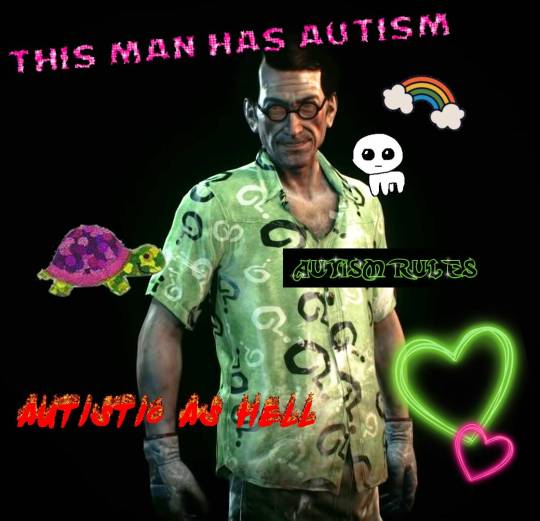
i figure eddie would never have been diagnosed. he's old enough to not have been identified as anything other than "gifted" at school and i think his parents seem like the type who would avoid diagnosis out of ~shame~ so he'd be misdiagnosed or not diagnosed at all (until batman comes along with his non-degree and decides eddie is an obsessive compulsive narcissist. which yeah, fair. but also hello pot, this is the kettle speaking????)
anyway i think he would avoid all long-term relationships out of trust and a need to prove himself as above human needs and completely elf-sufficient, but it'd be easiest for him to get on with someone who is also autistic, even if they had very different communication styles. and i bet that would confuse him at first like "why does this idiot not bother me as much as all the other idiots"
a lot of the "bonding" would be done in silence, and would probably come from a place of blunt honesty, where eddie realised he could trust his new friend because they're either not afraid enough to lie to him or are too honest to know better. and he'd relish the ability to turn to someone and say "you are making my space crowded with your existance and i need you to leave" without them getting all moody, because they'd understand immediately
there might be a point where he picks up on things that make his new buddy a lil bit different, but i think he'd recognise them as brilliance before he thought of them as something "wrong" with them. mostly, because he'd see himself reflected back. hyperfixations and obsessions with certain acts/scenarios/things, an either intense focus or a complete lack of it, prone to sensory overload (which eddie doesn't know the name of before he meets his friend, he just assumes he has anger issues and is bad for going into tantrums), and there's bound to be a point where they both come to the realisation that neither of them understands other people's emotions or morals (cue a shared conversation about how people think batman is acceptable but not eddie)
going back to the bonding in silence thing, he's 100% given the key to life when he realises parralell play works for him. like you're telling him that you can be in the same room with someone and do your own thing completely, but they're there if you think of a stupid pun or you want to walk over to them to say "look what i made" have them go "wow!" and then turn around and go back to work???? where has this BEEN all his life (although now that he thinks about it, he did enjoy quietly reading amongst the other inmates at arkham)
anyway, i think at a certain point he'd find the bravery to tell his new friend that he thinks they're soulmates. maybe he'd follow that up with a confusion about romantic intent or interest, maybe he'd request a formal recognition of their friendship. and no doubt his lil buddy would be confused until eddie says "we're soulmates because we are literally the same person. we do all the same things. we think the same way." and his friend is like "that's sweet, eddie. and yeah, we might be soulmates. but i think a lot of that is because we're both autistic"
and eddie is like
"we're both what? so you're? and i'm? OH!!!!!!!"
and then everything falls into place, like he's just solved a complex riddle he didn't even know he was working through and he's stuck standing there for a while like:
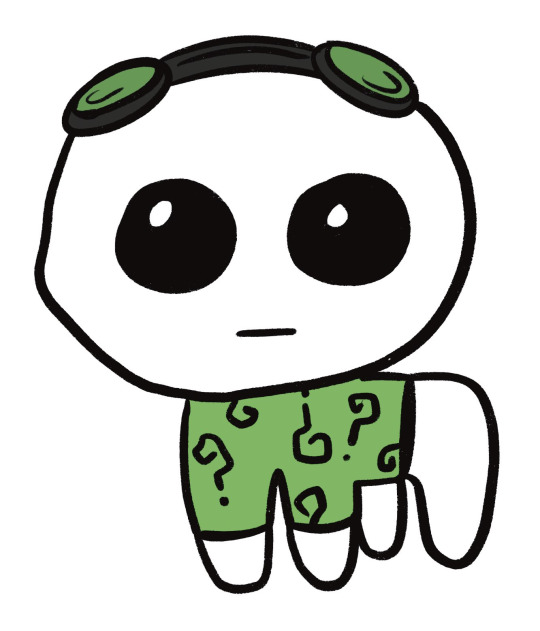
71 notes
·
View notes
Note
I also tried to find that Peter neurodivergent post recently and yup, vanished. But anyway, I just read your post and tags responding to that other person's ask saying they can't find it. I really really don't think you sound stupid (not that I'm a professional either).
That post hit deep for me because as someone very new to getting therapy, it reminded me of my first session (in which I said, do I have audhd or what?). My therapist told me first thing "there's a lot of overlap between these traits you're listing and trauma". I kinda sat back like 🧍she said what's more important is making sure I'm functioning, coping... That not everything needs a label unless I really want one. I went home and asked my housemate (who's currently doing their psychology masters) and she said, "yeah, both often get misdiagnosed for the other".
That kinda changed my whole perspective on everything and so reading your post brought me back to that. Hoo, emotional and stuff,,
Enough rambling though, my points are:
• Thank you for saying that, it meant a lot (I'm kinda crying haha)
• You're right about it all to my knowledge!
• I hope everything's okay with you and you're happy with what stuff will mean for you ❤️ good luck and all that!
(sorry for the essay)
bless you anon!! i'm really proud of you for taking the steps into therapy, and i really hope that it's a helpful experience in getting to understand yourself better! wishing you so, so much luck on your journey, anon!
i definitely think labels aren't for everyone - and sometimes, sometimes they can be a stifling thing. it's a fantastic thing when you need to simplify something to explain to someone else - especially fantastic when you need someone else to make considerations for you. i find i only really use labels when i need someone else to understand something about me in a simple sort of a way. so i say "bisexual" when i need to explain myself quickly, but it's a shorthand, and there's probably a much more complicated label that might fit me better - pan, maybe, but who has time or courage to explain pan to a 50-something-white-guy - certainly not i, so - for ease of understanding, i'll put myself in that box.
i think labels are fantastic when they make your life simpler - but sometimes they can do the adverse when you realise they don't fit as well as you'd thought. when you need a label to fit, and you feel that pressure to fit into it when - actually, actually, you are more complicated than that. then - then, you might realise, the label isn't for you, and you can either hunt down another or - be easy with the fact that you're a unique beast, and not everything will fit all the time. there's overlap, and every brain case is so so unerringly unique to the person.
it's like lgbt+ labels, lord knows, the kids are inventing a new one every week because there's no way to encompass everyone's unique approach to attraction. we can say "this is me, and you might feel similar" and that helps - but truly, no human is 1:1. no experience is 1:1. one of you watched cats (2019) and it irreparably altered your viewpoint on the world once you saw fuzzy idris elba dance on the screen. one of you (mercifully) didn't, and didn't sustain that trauma. you're different.
i hope any explanations you get help you move forwards, anon! but i hope you're also comfortable in the knowledge that there ain't no thing like you, 'cept you! (and i love you)
28 notes
·
View notes
Text
How psychiatrists actually diagnose DID because the DSM is a manual not a diagnostic tool
Excerpts written by Paul Dell from Dissociation and the Dissociative Disorders: DSM-V and Beyond

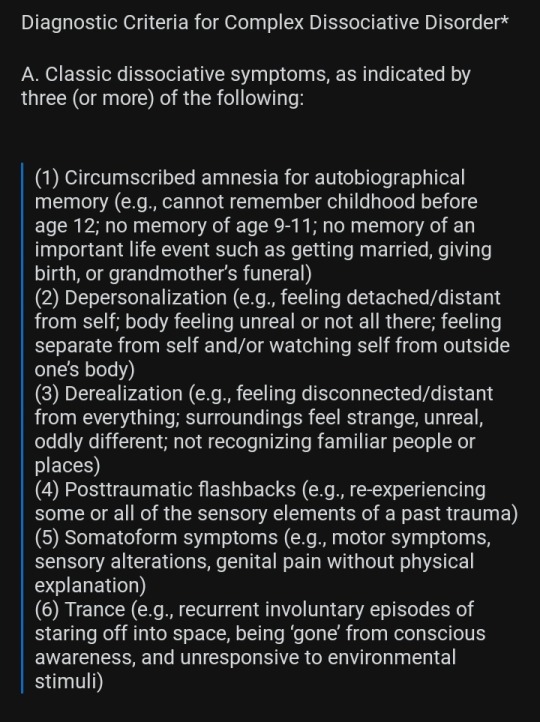
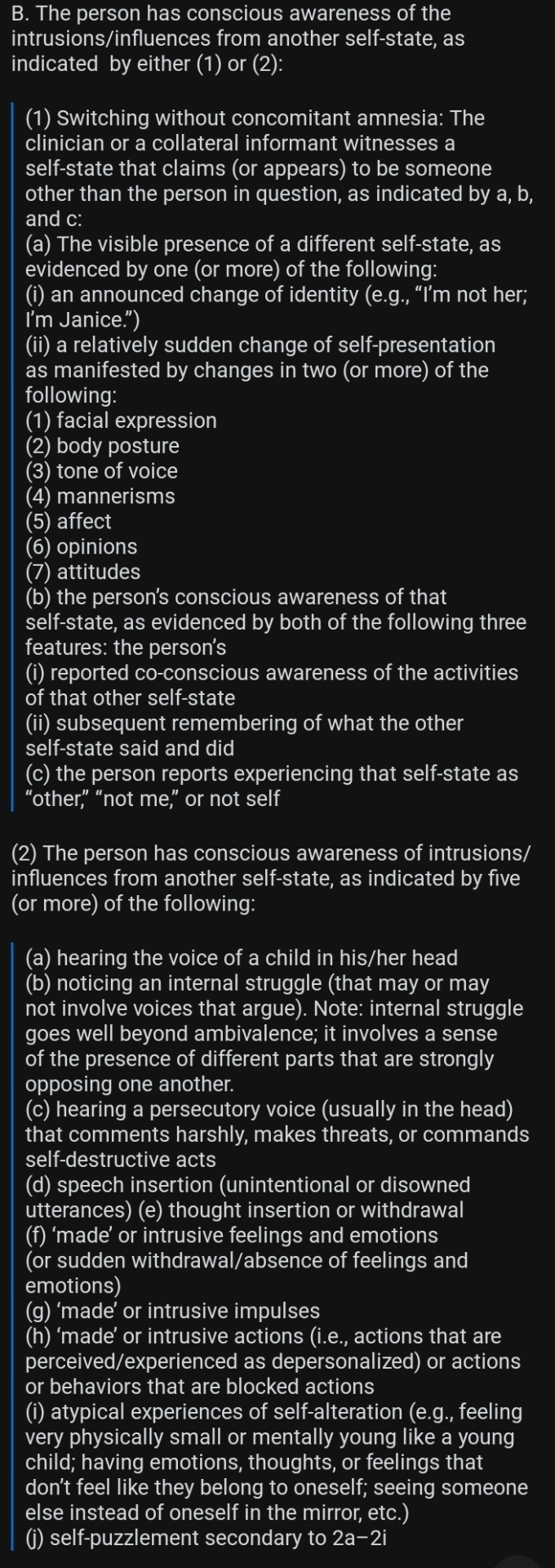

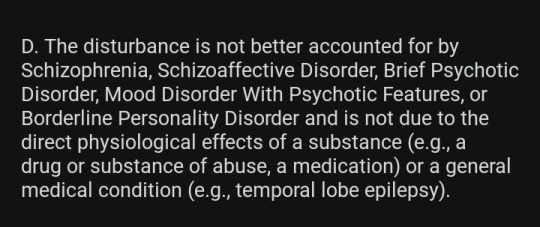

I am begging y'all to understand that "E. The symptoms cause clinically significant distress or impairment" applies to ALL of the symptoms listed. Not distress over being a system itself.
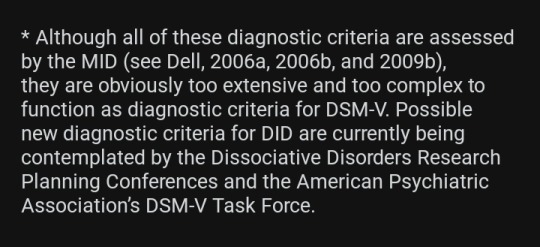
The DSM and ICD are not suitable diagnostic tools because they're a list of all the currently accepted disorders, for brevity's sake everything is condensed. Diagnostic tools that focus on a smaller subset of disorders are able to get into much more precise symptomology and phenomenology.
A successful diagnostic tool:
a) Can satisfy the criteria set out in the DSM and ICD
2) Is able to detect as many people with the disorder as possible (doesn't under diagnose)
iii) Is able to exclude as many people without the disorder as possible (doesn't misdiagnose)
And most importantly for DID) Is able to capture and identify the full range of patient experience (doesn't diagnose you with depression and calls it a day)
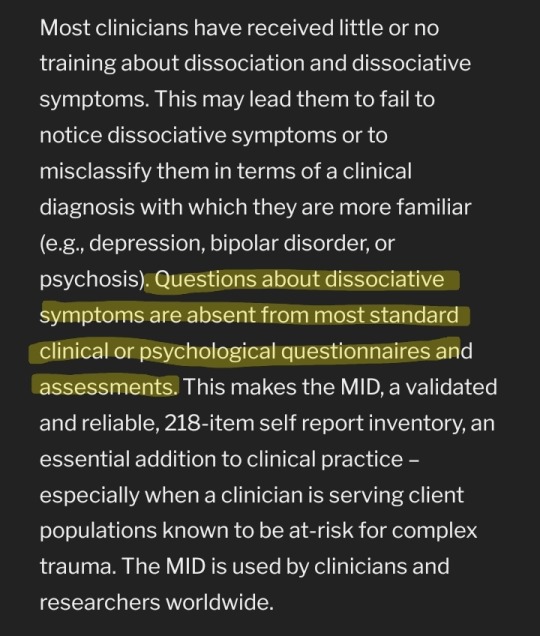
For instance, I know for a fact that my local psychiatric team use a tool that includes a possible diagnosis of BPD but not DID, so if I went through that assessment process I would get a diagnosis of BPD, whereas the MID can diagnose both (plus the other Dissociative disorders and PTSD).
DID is a really tricky thing to diagnose because it's designed to hide itself. The DSM criteria really only focus on the main most obvious and blatant symptoms and are therefore only useful in a minority of cases, the DSM-IV criteria used to require a switch being witnessed by a therapist for fuck sake lmao. Now I might switch in therapy a lot but my alters do their damned best to hide it when it happens. The disorder was hidden from me for a whole 25+ years, did I not have DID when I didn't know? I was just depressed and anxious right? How could I be distressed by alters I didn't know I had? I was absolutely distressed by my symptoms and damn was I relieved to find out I had alters to help with them but I still have DID, I always had DID.
And look, this isn't to tell anyone they're wrong about themselves or their own experiences, but the diagnostic criteria are not for US to interpret. They're for professionals to interpret and discuss and debate and refine to make sure they're actually doing their job properly.
So much of the bullshit in syscourse is just arrogant pedantry over ambiguity in definitions and for a lot of it, other much more qualified people have done it for us
51 notes
·
View notes
Text
They are winners...Elumax

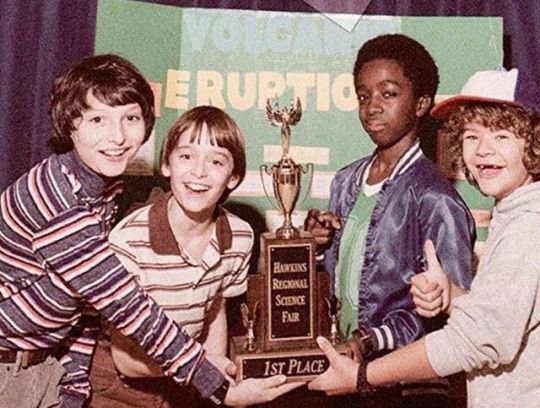
1st place... MadMax ranking 1st (I have an idea what the number might be about - it's probably math based. 751.300...)
And these two wake up, greeted in a similar way and... They are winners?
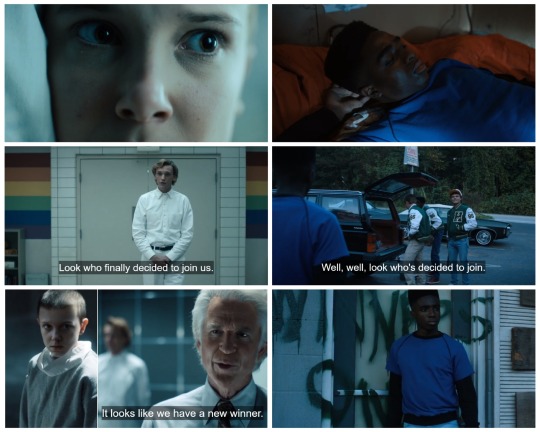
(*)
Notice how Lucas is in the physical world and El in a memory.
Yeah, they'll win.

The two lovers. They fought for her, Lucas in the physical world and El in the mind, and they'll win. (Or technically have even if it doesn't look like it) - in this scene only El is a "ghost", it's her mind avatar (she had blood stains her physical self doesn't on her shirt) while the Lucas & Max we see are a physical representation of them.

Incidentally the differences in appearance is also very much like in Matrix with Neo and others do look different in the real world and in the virtual reality.
But nonetheless... We have two winners here.

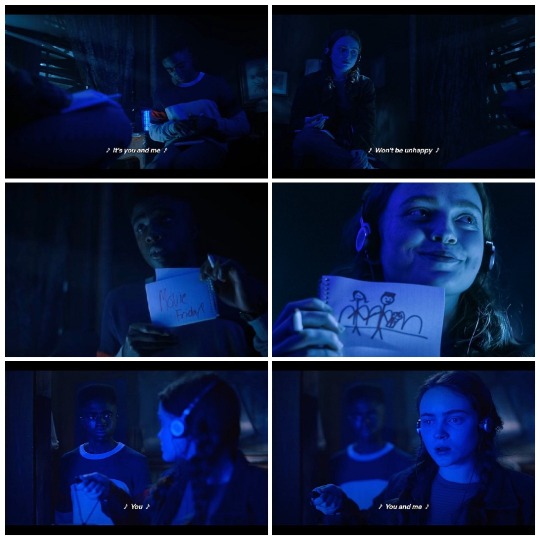
Elumax.
And the fact that Lucas is in the physical world and El in the mind, these paralleled scenes in daylight and in darkness, kinda tell you who is the lover in which realm. Both come with a catch. But they...won't be unhappy.
...........................
I know, you don't believe me but for those who do:
Lumax's love language is vision (which according to the established rules can be absorbed from others) and ElMax is touch - that Max won't directly see Lucas, yet through someone else, she will and not be able to touch El physically but only in the mind are the probably the downsides of their relationships.
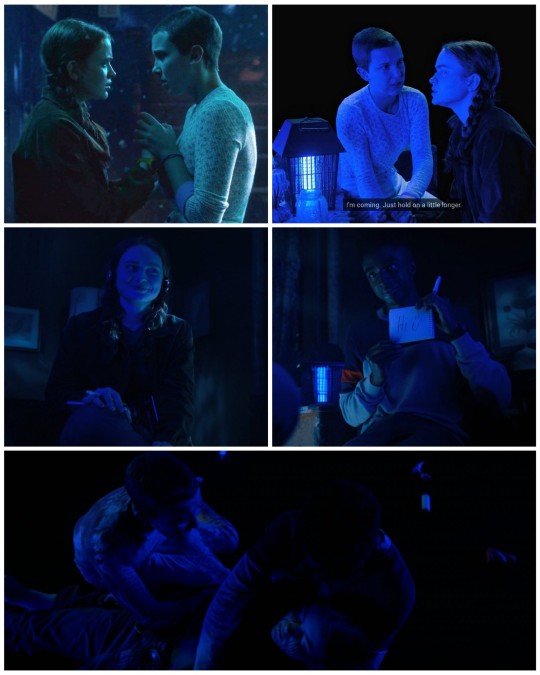
It's quite obvious that putting a character in this kind of situation in a supernatural show, is meant to be resolved in a way that is in line with the genre rules. This isn't a realistic drama show but one which uses supernatural elements as metaphors. And if harming a character in a supernatural way is possible, the reverse is within the actual rules of that particular universe and the genre...besides: It's fiction. Especially the movie date is foreshadowing which leads to the question: How? Not if.
Besides: Elumax would have an insane amount of representation. A biracial hetero-relationship, a poly, a homosexual relationship, a disabled girl that is also healed through queer love (blind and not blind at the same time bc of DID which did truly happen, a woman misdiagnosed with brain damage because after an accident she was blind but it turned out that she has multiple personality disorder), a positive representation of DID through this, Max being trans coded..... I think it speaks for itself.
PS: *I think Herobylers noticed these scenes but I'm not sure.
#elmax#max mayfield#stranger things#el hopper#elmax is endgame#stranger things analysis#lumax#elumax
25 notes
·
View notes
Note
This might be upsetting but I just saw a post from did a dose of reality and it was concerning to say the least. They said the disorder wasn’t real but they play along with their clients pretending to validate their alters, only because they think that will intergrate them.
And that the only patients that leave them are the “fakers.”
Yikes!
Actually, what is even going on with that blog? There is so much blatant misinformation there.
1. Partial DID
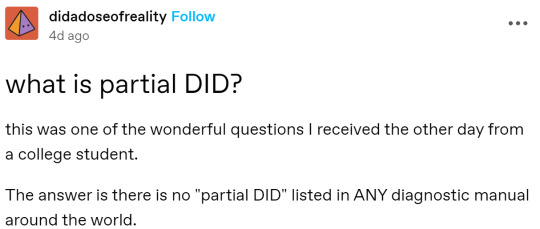
ICD-11:
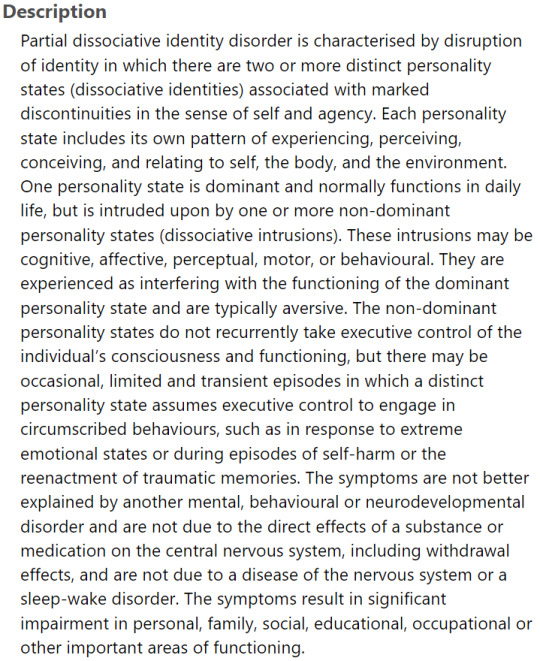
Do I need to say more?
2. Hallucinations in Dissociative Identity Disorder
They also suggest a few time that DID doesn't involve hallucinations...


Now... I doubt that "those in therapy" are aware of the DSM-5-TR, which is what I think this person is referring to since they talk about it elsewhere. Like, most therapists probably won't give their patients a rundown of the new medical manuals, right? But even if they did, I feel this person missed something pretty important in the TR.


But the TR actually undersells this association. According to one study, these hallucinations are MORE COMMON THAN IN SCHIZOPHRENIA.

And not by a small margin either.
Physical sensations associated with voices were reported 97% of the time in DID compared to 50% in Schizophrenia groups. Visual hallucinations were nearly twice as common. Tactile hallucinations, about 3 times as common.
This misinformation is genuinely dangerous.
If this alleged therapist decided that hallucinations are all psychotic, then their perception of DID could very easily be influenced by the fact that they've misdiagnosed many of their dissociative patients with psychotic disorders.
3. People with DID want their alters gone
I'm going to note that the title is my interpretation. They don't clearly say this. They just say that people with DID want to finish the job and cure it. But the way they talk about alters strongly leaves this impression.

I absolutely think it's true that most people with DID don't want to have a disorder.
But many would like to pursue healthy multiplicity.
And I'd like to point again at the table in the above study. When participants were asked if they would miss their voices if they stopped, a massive 69% answered that they would. That's a huge majority of DID systems in that study.
4. Complex DID
There is actually a certain level of truth to this one too. Complex-DID is not an official diagnosis, and HC-DID is a community term that can be a bit misleading because it sounds like a clinical term. (Similar issue with emotional amnesia.)
Having said that... this is a really silly way to go about this...
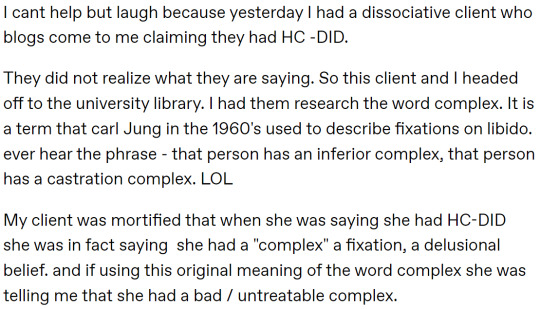
"Complex" as an adjective means that something is complicated. It's not the same as the noun "complex." Having a "complex disorder" would never be related to "having a complex."
Might as well try to convince your student that they're claiming to be an apartment complex.

I would suggest both they and their student take an English class.
Anyway, while HC-DID isn't a medical term and C-DID isn't an official diagnosis, I suspect "complex DID" likely comes from this paper.


5.) The Flight or Flight Reaction
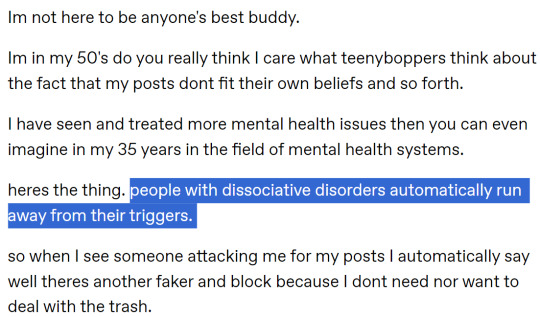
Remember, if you make someone with a dissociative disorder angry, they'll always run away because they're literally incapable of fighting back. If they do argue with you fakeclaiming them, then that PROVES they were faking all along.
Never mind that not every instance of people being upset with you on the internet and calling you our for harmful behavior is because they're triggered. (In the traumatic sense.)
Never mind that "Fight" is a natural reaction to trauma when it is triggered.
Never mind that people who might normally run away were it something triggering you said to just them may engage because they don't want your words harming other people. /s
Anyway, yeah... this is a really gross blog from a very ableist and uninformed therapist, filled to the brim with misinformation, and I would highly advise people ignore it.
#syscourse#system discourse#pro endo#pro endogenic#sysblr#multiplicity#psychiatry#psychology#therapy#mental health#ableism#sanism#psych critical#systems#system#tw fakeclaiming
40 notes
·
View notes
Text
Post hoc ergo propter hoc might be wrong most of the time, but ...
A couple of days ago, for my birthday, I documented my fourth adverse reaction to a popularly-prescribed medication. None of which my doctor had even heard were possible, none of which I was warned about by my pharmacist.
Four times now, I've developed "a whole new disease" 6 to 18 months after starting a new medication. Four times I eventually thought to google my most recent medication and my current symptoms, and found that it was possible that I could be experiencing a (supposedly) "one per thousand" or even "one per ten thousand" person adverse reaction. Four times I asked my doctor to substitute a different medication, and lo and behold, the problem went away. Four fucking times.
And three of those four times, before I did so, I brought up the new problem as part of a physical, in front of a physician who had my whole chart in front of her, then she prescribed a new medication to treat my new symptoms, and I filled that prescription at a pharmacy where the pharmacist was looking right at a screen listing every medication I was taking. They both have degrees in this shit. Why was I the one who had to figure this out?
And also, bullshit that these adverse reactions are that rare. No way in hell I "won" a 1:1000 or 1:10000 lottery four times. And I know why, too: because I'm old, and I'm fat, and that meant that my doctor and my pharmacist "knew" what was causing my "new disease," either my age or my weight.
Skin dying and sloughing off around a recent incision? Yeah, that happens to old people and to fat people, they don't always heal well, just keep applying your antibiotic until it does. (Neomycin allergy: tissue necrosis.)
Mental fog and increasing dementia? Yeah, that happens to old people, nothing can be done. (Wellbutrin: mental fog. Lisinopril: mental fog.)
High blood sugar? Yeah, that happens to fat people, lose weight. (Thiazide diuretic: high blood sugar.)
And all four times, insisting on switching to a different medication solved the problem.
Oh, and that doesn't even count the fact that I was misdiagnosed with "drug seeking behavior" for telling my surgeons that the opiates were having no effect, despite the highly visible clue of my bright-red beard: I inherited the genes that make me totally opiate non-responsive. Count that as a fifth adverse drug reaction, if you like.
(Never mind that I wasn't asking for higher doses, I was telling them to stop prescribing opiates; that was "a clever ruse." And, oh, yeah, one clever nurse practitioner had heard of my condition and recommended I bully the doctor into prescribing Tramadol instead, which doesn't work perfectly, but provides some relief if I don't overuse it.)
So do not believe that an adverse reaction is as rare as the company says it is if and only if it's an adverse reaction that medical professionals are eager to explain away as having nothing to do with the medication, one they're eager to jump to conclusions and blame on age or weight or sex. Because in those cases, you're not measuring the adverse reactions, you're measuring the number of people with those reactions who fought to get them counted.
You have to have noticed by now that we tell people (or at least the white college-educated people) that they have to be "their own health advocates," but how in the hell is that supposed to even work, when we're not the ones with degrees in medicine and years' worth of experience with these conditions?
So, please pass this advice along to anybody who's on any medication for a chronic condition, anything they're going to have to take for years or forever to manage the symptoms of some supposedly incurable condition:
Any time you develop new symptoms, google-search each medication that you are taking, one at a time, followed by the symptom you've just recently developed. If you find any matches, no matter how rare it says they are, ask the doctor who prescribed that earlier medicine to suggest an alternative and try that before you let them add another medication.
Because otherwise you could end up one pill that treats your symptoms, but creates a new illness, so they give you another pill to treat that illness, and it causes a third illness, until you end up on so many pills that you're a walking biochemical disaster site. In fact, any time you meet someone (or if you are someone) who's taking, say, four or more separate medications for symptomatic relief, swap out the oldest medications for alternatives, the ones they've been taking the longest, until you rule out iatrogenic illness. Do not, not, not let them add a fifth, a sixth, whatever medication until you have ruled out adverse reactions. Your very life may depend on it!
And for whatever god damned reason, I wish I knew why, neither your doctor nor your pharmacist will think to recommend this if you don't.
78 notes
·
View notes
Text
I feel like sysmedicalism gets boiled down to just being anti-endo, and that's not really even the core of their beliefs. That's definitely a big part of it, but it's more of a side effect of their core beliefs. Those beliefs are:
Plurality only exists in the context of DID and similar disorders
Those disorders only ever happen as the result of trauma
Both the above points have been scientifically proven
Psychiatrists who study/treat DID, as well as the ISSTD, are more trustworthy than anyone claiming their personal experiences fall outside of what they believe "real DID" looks like
The only one of those that even might be true is the second, but I have no idea if it is or not, and it would be irresponsible to make the claim that it is without proof (correlation isn't proof, that's literally the first lesson in statistics). But what I want to focus on is the last point, because I think it explains everything else
People with DID/OSDD/etc have pretty much always been fighting an uphill battle against the general public's disbelief. This worsened significantly in the 90s. DID (then called MPD) got swept up into the Satanic Panic, and when aspects of that were disproven, everything else that got lumped in with it was assumed to be equally false. On top of that, there was a high-profile lawsuit against Bennett Braun (psychiatrist and founding member of the ISSTD) that alleged some pretty horrific abuse against a woman who claimed she was misdiagnosed and never had MPD/DID in the first place
This split the discourse. Some people condemned Braun and his associates for their treatment of their patients, and claimed that MPD/DID was made up. This is why the name was changed to DID, btw. The chair of the DSM-IV task force didn't believe it was real. On the other side of things, there were people who believed it was real, and therefore assumed everything being said about Braun and others was made up. There were some people, like those who were abused as "treatment" for MPD/DID, who believed that both plurality and the abuse were real, but they were largely ignored or silenced
Nowadays the issue is mostly simplified into "is DID real or not?". However, the idea that criticizing the ISSTD/psychiatrists who treat DID is the same as siding with the people who don't believe in it lingers. For many people newly diagnosed or discovering the online community and their place in it for the first time, these clinicians seem to be the only ones who believe their experiences are real. On top of that, there's a societal belief that being a doctor gives someone the authority to speak on medical issues in a way that being a patient doesn't. This goes doubly for anything mental health related. So these systems latch onto the ISSTD/psychiatrists and uncritically buy into everything they say (or what a game of twitter discourse telephone claims they say), even if it doesn't make sense, or if the proof just isn't there
So when they lash out at endogenic systems, or systems who claim to be people instead of parts, or any system that doesn't fit their idea of "real DID', it's because they see us as threats to their legitimacy. They think we can only be taken seriously if we go along with what the ISSTD claims. But this community has decades worth of very real reasons not to trust the psychiatrists making those claims
If you're a system whose beliefs align with the bullet points above, and you're starting to doubt the ISSTD (or even just some individual psychiatrists) because of the McLean video, take some time to look a little deeper. Look up what Bennett Braun got sued for malpractice for at least 11 times over (but be prepared, it will be triggering, it's some fucked up shit). Look up other prominent psychiatrists in this area, see how many of them have had accusations of abuse leveled against them. Try this video on Onno van der Hart, the primary contributer to the ToSD as it applies to DID (TW psychiatric abuse). And if you're starting to realize that perhaps they can't be trusted to be correct about everything, maybe it's time to consider what else they've said that's wrong
-Oliver (he/him)
P.S. If you're a dick on this post you'll be blocked on sight
#the quicksilvers say#syscourse tw#plurality#no seriously we wont debate you on this just leave us alone#but if you have genuine good faith questions thats fine
102 notes
·
View notes
Note
I have a question, and idk how well it’s going to come across but I’m trying to at least get words down
I think I might be autistic, but my mom says I developed like a normal child. I know having adhd can be linked to a higher chance of being somewhere on the autism spectrum, and vise versa, but I don’t really have problems with eye contact (it’s only very little I do) and I’m not quite sure.
I’ve looked into it, and I know a lot of the symptoms overlap, but I’m wondering if maybe I was misdiagnosed with ADHD or have both? Cause I do sometimes have trouble with tone and faces, but I can usually detect that. I also sometimes want to break down because of everything being too much, but it gives me a headache instead of me actually breaking down.
I’ve been wondering for a few months atp and I’m really confused
Sorry if the wording came out weird but I’m not the best articulating my thoughts into words
Hey, I'm definitely not qualified to diagnose you with either ADHD or autism, but if you relate to autistic traits and experiences it's a possibility - parents aren't necessarily going to notice traits when you're growing up due anything from lack of knowledge to being neurodivergent themselves and assuming everyone had those experiences. If you're wondering about how you were as a child, it might help to look at old school reports to see what your teachers thought about you.
Stress can cause headaches without it necessarily being a meltdown or shutdown, but I'm afraid there's no way for me to tell what you're experiencing from here.
My recommendation if you're wondering about it is to discuss your thoughts with doctor, a therapist, a counsellor etc who can give you professional advice, and maybe take some of the quizzes at Embrace Autism if you haven't already :)
38 notes
·
View notes